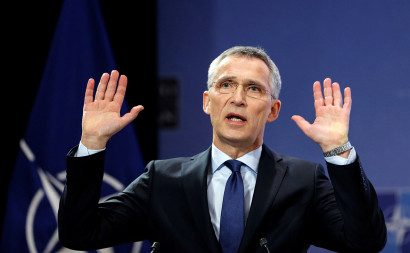
USD 402.56, EUR 440.64, RUB 4.58, GBP 505.01
+13 °C, +13 °C ... +26 °C Վաղը`+27 °C
+13 °C, +13 °C ... +26 °C Վաղը`+27 °C
NATO policy to the Greek-Turkish conflict
10:33, 12.09.2020
3384 | 0

Within the framework of the policy of complimentarism, Armenia has been observing how the NATO leadership behaves in relation to the Turkish-Greek conflict, and how the Russian-American confrontation is escalating. Unlike some post-Soviet countries, Armenia has never tried to use its partnerships with one side to the detriment of others, playing on contradictions. In the near future, the format of relations between the republic and NATO will remain the same. With the recent events, a clear awareness of the bleakness of the prospects for Armenia's integration into Euro-Atlantic structures has come. This happened due to the increased level of tension in relations between Turkey and Greece, which continue to be conditionally allies within the framework of the North Atlantic Alliance. The US pre-election campaign pays little attention to what is happening in the Eastern Mediterranean. The US aircraft carrier on duty periodically conducts exercises with either Greece or Turkey. In turn, the NATO bloc reacts painfully to the confrontation between its two members. Today, Stoltenberg General Secretary has one task - to organize at least "technical", but ne***iations between two full-fledged members of the North Atlantic Alliance. If only they did not shoot and did not create problems against the background of exercises both in Georgia ("Worthy Partner") and in the EU countries. With the firing of the very first Turkish cannon or the launch of a Greek combat torpedo, it will be possible to say that the North Atlantic Alliance went down before any Turkish or Greek frigate knocked out. Who will then give two percent of their own GDP to the military bloc? That is why, in the depths of the NATO administration, the concept of "technical ne***iations" arose - a term that is not accepted to be used either in diplomacy or in the military sphere. Meanwhile, former National Security Assistant to the US President John Bolton has unexpectedly announced that the head of the White House, Donald Trump, may announce the US withdrawal from NATO before the elections, scheduled for November 3. In reality, however, such a statement serves as a distraction from the alliance's ongoing deployment of an anti-missile defense system in Eastern Europe. In particular, the US Armed Forces are regrouping their troops in Europe in order to build up their military presence at the Russian borders. Against the background of the above processes, the sphere of strategic interests of the Republic of Armenia continues to include both the Eastern Mediterranean and the entire area of responsibility of the CSTO, as well as the Middle East. Proceeding from this, Armenia is interested in maintaining peace and stability in these regions. The key problems, due to which these regions have been "shaking" for more than one decade, cannot be solved in a day, they like a magnet attracted very different, close and distant actors, including those who have a great craving for the "game of geopolitics" neo-imperialists, Turkey is the main danger for Armenia. The NATO leadership ignores Turkey’s statements of support for Baku and readiness to establish relations with Armenia only after a pro-Azerbaijani solution to the Karabakh issue, as well as Azerbaijan’s threats to take Yerevan. It is not surprising when the confrontation between the Greeks and the Turks threatens to turn into a serious geopolitical conflict between Paris, Berlin and Washington. |
Հեղինակ` Գագիկ Ծառուկյան
Նյութը հրապարակվել է Մամուլի խոսնակի շրջանակներում:
Կիսվի՛ր այս նյութով՝
Գագիկ Ծառուկյան
11:33, 15.11.2023
298 | 0
18:26, 20.09.2023
343 | 0
Մամուլի խոսնակում հրապարակված բոլոր նյութերը ենթակա են ազատ հրապարակման և կարգավորվում են գրանցման պայմանագրով:
Այլ կայքերից նյութերի արտատպումը թույլատրվում է միայն այն դեպքում, եթե չի հակասում աղբյուրի օգտագործման պայմաններին:
Գովազդների բովանդակության համար կայքը պատասխանատվություն չի կրում:



























